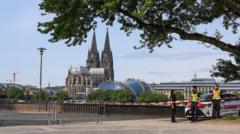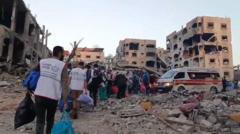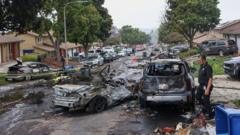This operation marks the largest evacuation in Cologne since the end of World War Two as the city tackles the risks posed by lingering bombs.
**Cologne Conducts Massive Evacuation for WWII Bomb Disposal**

**Cologne Conducts Massive Evacuation for WWII Bomb Disposal**
Authorities evacuate 20,500 residents as experts prepare to defuse unexploded ordnance.
The German city of Cologne has initiated a significant evacuation, displacing approximately 20,500 residents from central areas to safely disarm three unexploded World War II bombs. These American bombs were unearthed in a Deutz shipyard earlier in the week. Due to the potential dangers associated with unexploded ordnance, the city has established a secured perimeter extending 1,000 meters (3,280 feet) from the discovery site, dubbing this operation "the largest since WWII."
City officials have mandated the evacuation of homes, shops, schools, hotels, and even a major hospital, in alignment with the evacuation efforts. Authorities have made it clear that noncompliance would result in police enforcement, emphasizing, "If you refuse, we will escort you from your home – if necessary by force." Those who chose to remain risks incurring hefty fines. Emergency procedures saw intensive care patients being transported from Eduardus Hospital to ensure their safety amid this unprecedented happening.
Such finds of WWII explosives are not rare in German cities like Cologne and Berlin, but their size and potential risk have heightened the urgency of this evacuation effort. The defusal of the bombs is scheduled for Wednesday, contingent upon the area being entirely vacated.
As the operation commenced, officials conducted door-to-door checks to ensure compliance, resulting in eerily quiet streets as what typically would be bustling commerce came to a halt. Local cultural venues, including the Philharmonic Hall and numerous museums, have suspended operations along with 58 hotels and nine schools. Transport visibility severely diminished as roads were cordoned off, public transport, including trains from the Messe/Deutz station, was disrupted significantly.
For those unable to find alternative accommodation during this evacuation, the city has set up two support centers. Residents have been urged to keep calm, bring essential medicines, valid identification, and care for their pets. Although Cologne's Bonn Airport maintains its flight operations, accessibility remains a challenge due to transportation closures.
Amidst these disruptions, fifteen couples who had planned to wed at Cologne's historic town hall faced logistical hurdles as their ceremonies had to be relocated elsewhere. As the situation evolves, local media invite those affected to share their experiences.
City officials have mandated the evacuation of homes, shops, schools, hotels, and even a major hospital, in alignment with the evacuation efforts. Authorities have made it clear that noncompliance would result in police enforcement, emphasizing, "If you refuse, we will escort you from your home – if necessary by force." Those who chose to remain risks incurring hefty fines. Emergency procedures saw intensive care patients being transported from Eduardus Hospital to ensure their safety amid this unprecedented happening.
Such finds of WWII explosives are not rare in German cities like Cologne and Berlin, but their size and potential risk have heightened the urgency of this evacuation effort. The defusal of the bombs is scheduled for Wednesday, contingent upon the area being entirely vacated.
As the operation commenced, officials conducted door-to-door checks to ensure compliance, resulting in eerily quiet streets as what typically would be bustling commerce came to a halt. Local cultural venues, including the Philharmonic Hall and numerous museums, have suspended operations along with 58 hotels and nine schools. Transport visibility severely diminished as roads were cordoned off, public transport, including trains from the Messe/Deutz station, was disrupted significantly.
For those unable to find alternative accommodation during this evacuation, the city has set up two support centers. Residents have been urged to keep calm, bring essential medicines, valid identification, and care for their pets. Although Cologne's Bonn Airport maintains its flight operations, accessibility remains a challenge due to transportation closures.
Amidst these disruptions, fifteen couples who had planned to wed at Cologne's historic town hall faced logistical hurdles as their ceremonies had to be relocated elsewhere. As the situation evolves, local media invite those affected to share their experiences.





















